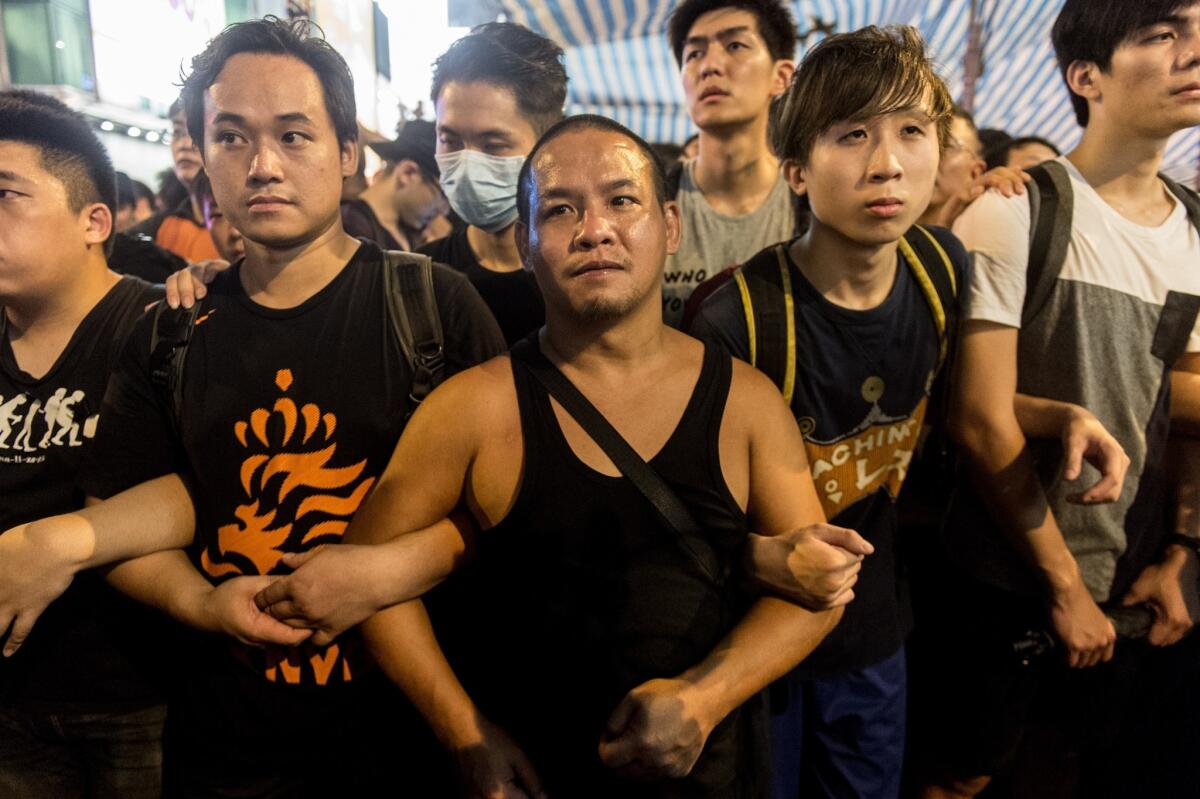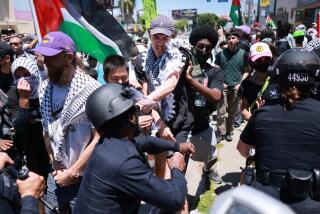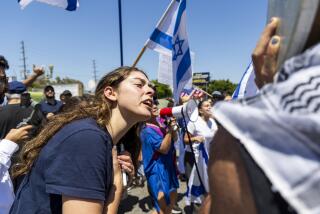Violent turn to protests is another jolt to orderly Hong Kong

Reporting from Hong Kong â Opponents of Hong Kongâs pro-democracy movement violently confronted its supporters Friday in the dense commercial district of Mong Kok, ripping down canopies, dragging away metal barricades and throwing punches as the street protests took a chaotic and bloody turn on their sixth day.
Screaming until they were red in the face, dozens of men pumped their fists and yelled âGet out!â while urging police to clear protesters from the intersection of Nathan Road and Argyle Street, a dense commercial center that has been blocked off for days.
âCalm down!â âProtect the students!â members of the pro-democracy camp yelled in return, some youths bursting into tears.
Hundreds of police were dispatched to the scene, struggling to keep the situation from erupting into a full-blown riot as water bottles were lobbed and curses hurled. Dozens of people suffered scrapes, bruises and other injuries, but the student-led demonstrators held on at the site. The confrontations began in the early afternoon and the situation remained tense late into the night.
It was not immediately clear whether the opponents represented a spontaneous objection among residents to the protesters, who have filled the streets and disrupted commerce. Several prominent politicians who have supported the democracy protests said they believed the opponents had links to the Triad criminal gangs.
Nineteen people were arrested, police said early Saturday. Eight of them have âTriad backgrounds,â said district commander Kwok Pak-chung.
The chaotic scenes were a new shock to the public in this semiautonomous Chinese territory, which has a long tradition of orderly and peaceful public protests. The fistfights and growing inconvenience could undermine public support for the democracy movement.
âWe need to eat; these protests are just a game!â shouted one woman at the Mong Kok confrontation. A woman interviewed by local TV complained, âI have had to care for my daughter by myself all weekâ because her school has been closed.
But the confrontations seemed to steel the resolve of the democracy movementâs supporters, who just hours earlier had appeared dejected and divided after a leading student protest group, the Hong Kong Federation of Students, said it had agreed to hold talks with government officials about their demands.
The protesters are angry in part that Chinese leaders, who have said Hong Kong voters can for the first time cast ballots in 2017 for the chief executive post, want to limit votersâ choices to two or three candidates who pass muster with Beijing.
After nightfall Friday, the federation said in a statement that, after the violence, it was suspending its plan to sit down with officials, accusing police of not doing enough to protect pro-democracy demonstrators.
âThis is just as bad as the previous use of violence [by police] to clear occupied areas,â the organization said, referring to officersâ use of tear gas Sunday night against demonstrators.
Hong Kong Chief Executive Leung Chun-ying appealed to the public to leave the area so that order could be restored, but police refrained from clearing it by force. âThis is approaching a state of anarchy,â he said.
Rumors circulated that at least some opponents of the protests were hired thugs and that some were from mainland China.
âInstigators have attacked our supporters with malice,â said Benny Tai, a founder of the pro-democracy group Occupy Central With Love and Peace.
Added Chan Kin-man, another Occupy organizer, âOn the one hand the officials want to have a dialogue, but on the other hand mobs are attacking our supporters. Then where is the sincerity to have a dialogue? We want to know if this is the doing of the entire administration or of C.Y. Leung.â
Earlier Friday, the Hong Kong government closed its central office and asked civil servants to work from home or alternative locations as a sit-in continued around Leungâs office building and pro-democracy demonstrators blocked a key thoroughfare, Lung Wo Road, which has been the only main east-west artery open in recent days on Hong Kong island.
A government spokesman condemned the protesters for blocking police in their attempts to deliver food and water to officers stationed in government buildings. A statement suggested that the demonstrations were being directed not by student leaders or the Occupy Central movement but by âradical social activists.â
Protesters rejected those allegations and lashed out at police for not doing more to control the situation in Mong Kok, which is on the Kowloon peninsula, across Victoria Harbor from Hong Kong island.
One Occupy Central supporter said he suffered head injuries when he was kicked to the ground and pummeled.
âThe cops just watched us being beat up. Why donât they enforce the law?â said the man as he collected himself on the steps of the Mong Kok subway station, a scrum of TV reporters shoving microphones at him. Blood dripped from the side of his head and stained his collar. âThey didnât use violence, but then they condoned violence.â
Mark Ledford, a tourist from Orange County, spent the afternoon taking in the scene at the intersection. âI donât have politics when Iâm on vacation, I like to say,â said Ledford, who runs a kidsâ sports center in Rancho Santa Margarita and experienced tear gas earlier in the week when police clashed with protesters. âBut I support what the students are doing out here.â
As a business owner, Ledford said, he understands that some Hong Kong shop owners might be upset about the demonstrationsâ effect on their business, but ultimately, he said, the foundations of enterprise depend on the kind of democratic principles the protesters are seeking.
Where the movement goes from here â and how the conflict will be resolved â remains murky. Even if talks are held, itâs unclear whether demonstrators will accept a compromise.
âWe donât really have one strong leader,â a 24-year-old air traffic controller at Mong Kok said Friday night, refusing to give her name for fear she could face reprisal at work. âSo I think it is hard for them to negotiate effectively.â
Still, she said, taking note of the throng of foreign reporters at the intersection, âif all this accomplishes is showing the world the difference between Hong Kong and China, then thatâs a good thing.â
Special correspondent Violet Law contributed to this report.
More to Read
Sign up for Essential California
The most important California stories and recommendations in your inbox every morning.
You may occasionally receive promotional content from the Los Angeles Times.











